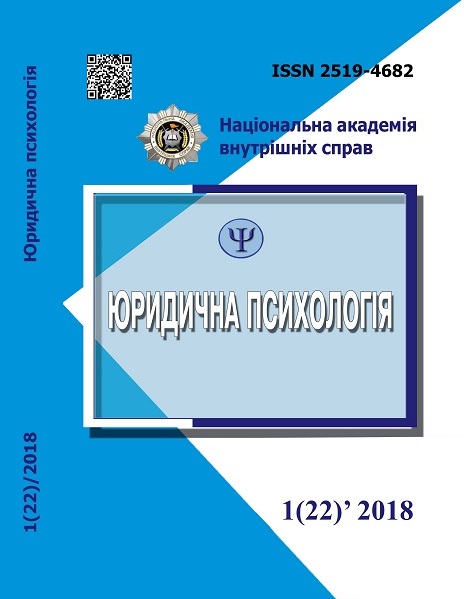Communicative Competence of Patrol Police as a Problem of Juridical Psychology
Abstract
In the article the problem of interpretation of communicative competence is considered. The concept of the communicative competence of patrol policemen researched by many native and foreign researchers is being considered and clarified. Various scientific approaches to the definition and understanding of the concept of communicative competence of the individual are described and analyzed. Communicative competence is interpreted as a complex integrative, professionally important quality of personality, which manifests itself in the ability and willingness to establish, maintain and develop effective interpersonal interaction in various situations of professional communication. The structure and components of communicative competence are distinguished: knowledge in the field of personality psychology, group, communication; skills and communication skills; correction and development of facilities necessary for successful communication; the ability to adequately and fully perceive and evaluate themselves and others, as well as the relations that arise between people; correction and development of the system of relations. The main factors that determine development and increase the level of communicative competence, on which the course and result of the communicative process as well as the success of the solution of the professional activity depend on, are indicated. The specifics of the professional activity of patrol police are substantiated. The importance of the communicative competence of the patrol policeman in their professional activity, the readiness and ability to communicate effectively with citizens in everyday life and in extreme situations are substantiated. The communicative competence of the patrol police of the National Police of Ukraine is one of the most important characteristics of their general professional competence. The problem of forming a communicative competence in the process of educating patrol police is extremely relevant.
Downloads
Abstract views: 226 PDF Downloads: 62
- Authors reserve the right to authorship of their own work and transfer to the magazine the right of the first publication of this work under the terms of the Creative Commons Attribution License, which allows other persons to freely distribute published work with mandatory reference to authors of the original work and the first publication of an article in this magazine.
- Authors have the right to enter into separate additional agreements on non-exclusive dissemination of the work in the form in which it was published in the journal (for example, to post an article in the institution's repository or to publish as part of a monograph), provided that the link to the first publication of the work in this journal is maintained.
- The journal's policy allows and encourages the posting of articles by authors on the Internet (for example, in electronic storehouses of institutions or on personal websites), both before the submission of this manuscript to the editorial office and during its editorial processing, as this contributes to the creation of a productive scientific discussion and positively affects the efficiency and dynamics of citing the published work.




